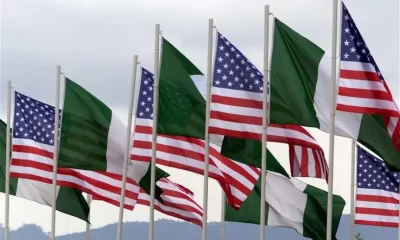National Issues
N500 No Longer Buys A Stomach-Filling Meal In Nigeria As Food Inflation Deepens -By Isaac Asabor
In fact, it is not an exaggeration to opine at this juncture that not a few Nigerians are under the ongoing administration been led by President Bola Ahmed Tinubu grappling with soaring food prices amidst the prevailing inflation surge.

In the crucible of economic challenges and evolving priorities, Nigeria’s consumer market literarily embarked on a transformative journey in 2023, precisely on May 29 when President Bola Ahmed Tinubu declared that “Subsidy Is Gone”. Since the declaration, food inflation has continued to soar steadily to the detriment of not a few Nigerians across households.
In a similar vein, businesses have been grappling with the soaring food inflation and currency devaluation, and given the situation not a few caterers and restaurateurs alike are strategically navigating a complex landscape shaped by the adaptive strategies of consumers, even as mere N500 can no longer suffice for Nigerian staple dishes that were once considered to be Giffens. Such category of foods cut across rice, yam, beans, plantain, eba and amala among other staple foods sold by the roadsides. Whether for breakfast, lunch, or dinner, the purchasing power of the naira has unarguably diminished, prompting consumers to explore innovative ways to stretch their budgets.
Without a doubt, across urban communities in Nigeria, where street food has long been a staple for many, the affordability of a quick meal is rapidly diminishing. The once-reliable N500 note now falls short when it comes to satisfying hunger pangs at roadside food stalls. The culprit? Soaring food inflation.
In fact, street vendors, known for their delicious and budget-friendly offerings, are feeling the pinch. A plate of Jollof rice, a popular local dish, used to cost N500 or less, within Ogba vicinity in Lagos, now sells for N1500 or close to N2000. The reason for the foregoing consumer market situation cannot be farfetched as food prices are by each passing day surging since the “Subsidy Is Gone” Declaration was made on that unforgettable day. It is so deplorable that the price of same plate of Jollof rice has now risen three times more. The reason for the unfriendly market situation is not unexpected as the rising cost of ingredients, such as rice, tomatoes, and spices have forced vendors to adjust their prices upward. For many Nigerians, this means rethinking their daily food choices and seeking alternatives to the once-affordable roadside meals.
True to type, particularly having being once rated by the World Values Survey to be the world’s happiest people, not a few Nigerians have resiliently adjusted to the situation even as food inflation deepens, Without any iota of exaggeration, Nigerians are adapting. Some opt for smaller portions, while others explore home-cooked options. The government’s efforts to stabilize prices and support local farmers are crucial, but the road ahead remains challenging. For now, the N500 note serves as a stark reminder of how inflation impacts even the most basic aspects of daily life in Nigeria.
In fact, it is not an exaggeration to opine at this juncture that not a few Nigerians are under the ongoing administration been led by President Bola Ahmed Tinubu grappling with soaring food prices amidst the prevailing inflation surge.
The situation is obviously dire as it is on record that in December 2023, inflation hit an all-time high of 28.92%, the highest since January 2003. In fact, food prices, which contribute significantly to the headline inflation rate, continue to surge. Ostensibly in the bid to identify the root of the problem, factors such as insecurity affecting farmers, climate change, and increased input costs (seeds and fertilizers) which have no doubt hampered food production have being identified as the causes. The situation is dire, with almost one in ten farmers facing food insecurity, particularly in the Northern parts of the country.
At this juncture, it is expedient to note that when food is not reliably available to families, it can have long-term effects on the broader economy. Not only does food insecurity stunt physical development; it also shrinks productivity, wastes money, and harms educational outcomes, therefore reducing overall lifetime earnings for those who experience it.
In fact, food insecurity can affect current workforce participation and harm the future workforce, such as chronic school absences among children suffering from it. This insecurity also worsens chronic illnesses, which can carry staggering healthcare costs.
Given the foregoing backdrop, it is expedient urge President Bola Ahmed Tinubu to prioritize policies and programs aimed at making food more affordable in Nigeria.
The president should encourage state governors to prioritize agriculture by investing in food crops. This is as high food prices remain a challenge, and it is essential to address this issue collectively. By securing farmlands and supporting subsistence farming, the government can drive down costs. In fact, Tinubu’s administration should continue impressing upon state governors the importance of agricultural investment. Additionally, promoting local production and discouraging excessive reliance on food imports will contribute to food security.
In a similar vein, Tinubu’s administration can take further steps to boost food security. By providing concessionary capital to sectors like fertilizer, processing, mechanization, and storage, the government can stimulate production and reduce post-harvest losses. This approach ensures affordable food prices for Nigerians. The National Commodity Exchange, seed companies, research institutes, and other stakeholders should collaborate to achieve these goals. President Tinubu’s commitment to enhancing food security will positively impact the lives of Nigerians and strengthen the nation’s economy.










